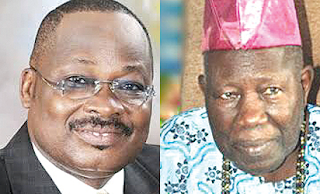OBASHIP TISSUE: AJIMOBI APPEALS JUDGEMENT, SAYS JUDGE AIKI WANDERED ON 11 GROUNDS
GOVERNOR Abiola Ajimobi, through his counsel, Yusuf Ali, has filed a suit asking the Court of Appeal to set aside the ruling and judgement of Justice Olajumoke Aiki delivered on 19th January, 2018, which declared the review of the 1957 Olubadan Chieftaincy Declaration as unconstitutional, illegal, null, void and of no effect.
In the suit number, M/317/2017 with High Chief Rashidi Ladoja and Honourable Justice Akintunde Boade (Rtd) as first and second respondents respectively, Ajimobi, the appellant, further asked for an order dismissing the case presented by Ladoja in its entirety.
The appeal was premised on 11 grounds stating that Justice Aiki erred in law and misconstrued facts and the provisions of Section 25 of the Oyo Chiefs Law in arriving at her judgement.
Furthermore, the grounds of the appeal were that the judgement was delivered against the weight of evidence and that the judge came to a perverse conclusion in granting Ladoja reliefs he was not entitled to in fact and in law leading to a grave miscarriage of justice against Ajimobi.
The grounds of the appeal, further included that the “trial judge erred in law by overruling all the heads of the Preliminary Objections raised to the competence of the Senator Ladoja case in the process failed and refused to follow decided authorities of Appellate Courts cited before him and thereby embarked on clustered justice which led to a miscarriage of justice against the Appellant.”
“The learned judge erred in law and came to a wrong conclusion by holding that, the Governor has no power to set up a commission of inquiry on the issue of beaded crown wearing Obas and Coronet crown wearing Obas contrary to the provisions of the Chiefs Law of Oyo state which donates such powers and authority to the Governor.”
“The Learned Trial Judge erred in law and totally misinterpreted sections 10, 12 and 25 of the Oyo State Chiefs Law in purporting to interpret these sections he introduced extraneous provisions which are not contained in the law, thereby excluding the general scheme and the general provisions of the law.”
“That the learned judge erred in law in granting reliefs that would serve no useful purpose and are impossible of enforcement having regards to the facts and circumstances of this case.”
“That the Learned Trial Judge erred in law and totally misapprehended the facts of the matter in overruling the objection of the Appellant on the inappropriateness of the Originating Summons proceeding in the determination of the first Respondent’s case.
“The Learned Trial Judge erred in law and gravely misdirected himself in holding that the case of the first Respondent as constituted is not academic, hypothetical and will serve no useful purpose.
“The learned trial judge erred in law by holding contrary to the facts and decided authorities of higher courts that the first respondent has locus standing to prosecute the case when even from his own showing, the issue the subject matter of his action affects millions of Ibadan indigenes over which he was unable to show special interests over that of other ordinary Ibadan indigenes.”
“The Learned Trial Judge erred in law by holding in spite of the paucity of facts making any positive allegation against the Appellant, that the suit discloses a reasonable or any cause of action at all.”









Comments